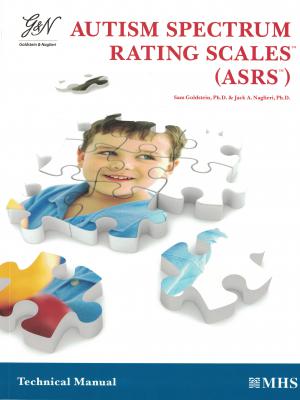The manual contains information required to use the ASRS. The first chapter introduces the ASRS and provides general information about each ASRS form. Chapter 2 presents the conceptual framework upon which the ASRS is based. Chapter 3 provides detailed information about administration and scoring procedures. Interpretation guidelines and a case study are provided in chapter 4. Chapter 5 provides an in-depth look into the history and development of the ASRS. Standardization, reliability, and validity information are provided in chapters 6, 7, and 8, respectively. Information about the development, reliability, and validity of the ASRS Short Form is provided in chapter 9. Finally, concluding remarks are provided in chapter 10.
Overview of the ASRS
The Autism Spectrum Rating Scales is used to quantify observations of young children and youth that are associated with the Autism Spectrum Disorders (ASD). When used in combination with other information, results from the ASRS can help determine the likelihood that a youth has symptoms associated with the Autism Spectrum Disorders; this information can then be used to determine treatment targets.
The ASRS is a multi-informant measure designed to identify symptoms, behaviors, and associated features of Autism Spectrum Disorder (ASD) in children and adolescents aged 2 to 18 years.
This innovative group of instruments, authored by the highly respected Sam Goldstein, Ph.D., and Jack A. Naglieri, Ph.D., is a norm-referenced assessment based on a nationally representative sample, designed to identify symptoms, behaviors, and associated features of the full range of Autism Spectrum Disorders. The ASRS assists in the diagnostic process, guides the development of intervention and treatment strategies, and monitors the response to intervention and treatment effectiveness.
Key Features:
- First nationally-standardized, norm-referenced ASD Rating Scale
- Easy administration, scoring, and results interpretation
- Excellent reliability and validity
- Short version can be used for screening or treatment monitoring
Items assess DSM-5 symptom criteria for ASD - DSM-IV-TR scoring still available for online and software options
Option to score children with limited verbal abilities
The full-length ASRS form includes all 70 (ages 2-5 years) or 71 (ages 6-18 years) items and yields several separate scale scores (i.e., The Total Score, and scored on the ASRS Scales, the DSM-5 and DSM-IV-TR Scale, and the Treatment Scales). This comprehensive form is recommended for use when a thorough evaluation of behaviors associated with the Autism Spectrum Disorders (ASD) is desired.
Handscored QuickScore Forms
The rater writes on the external layers of the form, and the results transfer through to a hidden scoring grid within the internal layers. The assessor then uses the internal layers for tabulating results. Each ASRS QuikScore form includes conversion tables, which are used to convert raw scored to T-scores and percentile ranks. For individuals who wish to use software scoring, ASRS items are also available as response forms that do not include the scoring pages.
Software scored Response Forms offer three report types for all ASRS response forms.
Interpretive Reports are comprehensive and present scores numerically and graphically.
Progress Monitoring Reports compare the results of two to four administrations from the same rater to measure changes over time. These reports are ideal when monitoring treatment and intervention.
Comparative Reports allow for a multi-rater perspective by comparing results of up to five different raters.
Normative Data
The ASRS was standardized on 2,560 cases from across the United States. The standardization includes 640 cases for the ASRS (2-5 years), with 320 parent and 320 teacher forms. Additionally, it included 1,920 cases for the ASRS (6-18 years), with 960 parent and 960 teacher forms. Over 1,200 clinical cases were also collected. The disorders in the clinical sample include:
- ASD (Autistic Disorder, Asperger's Disorder, and Pervasive Developmental Disorder-Not Otherwise Specified)
- Attention-Deficit/Hyperactivity Disorder
- Mood and Anxiety Disorders
- Developmental Delay
- Learning Disorders
- Communication Disorders


